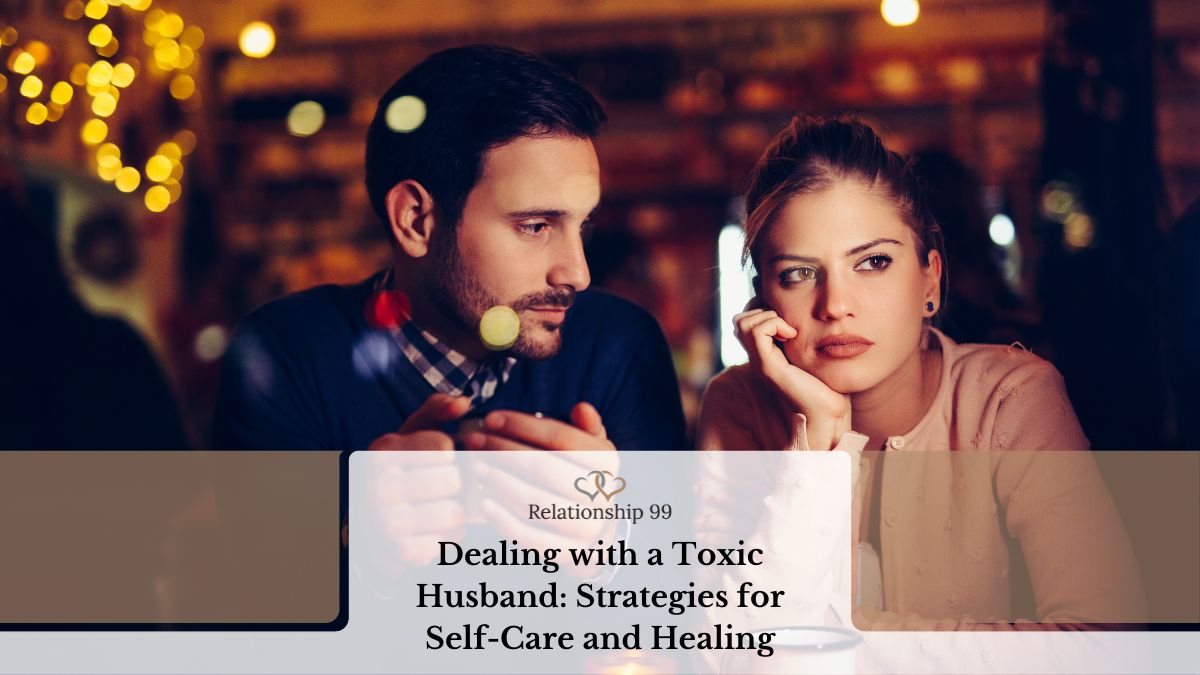As women, we are often taught to prioritize our relationships and put the needs of others before our own. This can be especially true in marriages, where we are expected to be patient, understanding, and forgiving towards our husbands no matter what. However, what happens when this dynamic becomes toxic? When do our husbands’ behaviors and actions towards us cross the line from difficult to downright damaging?
Dealing with a toxic husband is not easy, but it is also not something that you have to go through alone. In this blog post, we will discuss strategies for self-care and healing while navigating a toxic marriage.
Understanding Toxic Relationships
Before we delve into strategies for coping with a toxic husband, it’s important to understand what a toxic relationship is and its effects on us. A toxic relationship can be defined as one that is emotionally or physically damaging to one or both partners. It can involve controlling behavior, manipulation, emotional abuse, and even physical violence.

Being in a toxic relationship can have severe consequences on our mental and physical health. Constant stress and negativity from our partners can lead to anxiety, depression, low self-esteem, and other serious health issues. It’s important to identify the signs of a toxic relationship so that you can take the necessary steps toward healing.
Recognizing the Signs of a Toxic Husband
It’s not always easy to identify when we are in a toxic relationship, especially if we have been conditioned to accept certain behaviors from our partners. Here are some signs that your husband may be toxic:
- Constant criticism and put-downs: Your husband may constantly criticize your appearance, intelligence, or abilities. He may also make you feel inadequate and belittle your accomplishments.
- Controlling behavior: A toxic husband may try to control every aspect of your life, from what you wear to who you can talk to. This can leave you feeling trapped and isolated.
- Emotional manipulation: Toxic partners often use emotional manipulation to get what they want. They may guilt-trip you, play mind games, or gaslight you into thinking that everything is your fault.
- Lack of support: In a healthy relationship, partners support each other’s dreams and aspirations. However, a toxic husband may be unsupportive and even sabotage your goals in order to maintain control over you.
- Physical or verbal abuse: The most extreme form of toxicity is physical or verbal abuse. If your husband physically harms you or threatens to do so, it’s important to seek help immediately.

Strategies for Self-Care
Dealing with a toxic husband can take a toll on your mental and emotional well-being. It’s important to prioritize self-care in order to maintain your sanity and sense of self-worth. Here are some strategies that can help:
- Set boundaries: One of the first steps towards taking care of yourself is setting boundaries with your husband. Clearly communicate what behaviors are not acceptable and stick to them. This will also help you establish a sense of control in the relationship.
- Seek support: Don’t hesitate to reach out to friends and family for support. Opening up about your struggles can be therapeutic and help you feel less alone. You can also consider joining a support group or seeking therapy.
- Practice self-care: Make time for yourself every day, even if it’s just a few minutes. Engage in activities that bring you joy and make you feel good, whether it’s reading a book, going for a walk, or taking a hot bath.
- Focus on your health: When we are stressed and overwhelmed, our physical health often takes a backseat. However, it’s important to prioritize your health by eating well, getting enough rest, and exercising regularly.
- Seek professional help: If the toxicity in your relationship has reached a point where it’s affecting your mental and physical health, it may be time to seek professional help. A therapist can provide you with the tools and help you need to heal and move forward.

Healing from a Toxic Marriage
Forgiving Yourself
One of the biggest hurdles to healing from a toxic marriage is forgiving yourself. It’s common for women in these situations to blame themselves and feel guilty for not being able to fix the relationship. However, it’s important to understand that a toxic husband’s behavior is not your fault, and you are not responsible for fixing him.
It’s also important to forgive yourself for staying in the relationship for so long. We often stay in toxic relationships because we love our partners and hope that things will get better. But it’s never too late to leave and start healing.
Letting Go of Resentment
Resentment towards our toxic husbands can eat away at us and prevent us from moving on. While it may be easier said than done, it’s important to let go of this resentment in order to heal. Holding onto anger and bitterness will only continue to hurt us.

Try practicing forgiveness, not for your husband’s sake, but for your own peace of mind. This doesn’t mean that you have to forget or condone the toxic behavior, but rather release yourself from the burden of holding onto negative emotions.
Moving On
Healing from a toxic marriage also means moving on with your life. This can be scary and overwhelming, but it’s important to remember that you deserve happiness and a healthy relationship.
Start by setting new goals for yourself and making plans for the future. Surround yourself with positive powers and focus on rebuilding your self-esteem. Remember, you are strong and capable of creating a better life for yourself. You deserve it.

Final Thoughts
Dealing with a toxic husband can be incredibly difficult, but it’s important to remember that you are not alone. With the right strategies and support, you can navigate this challenging situation and come out stronger in the end. Take care of yourself, and never hesitate to seek help when needed. Most importantly, always remember your worth and never settle for anything less than a loving, healthy relationship. So don’t wait any longer – take the first step towards healing today! Stay strong and keep moving forward – you’ve got this.

